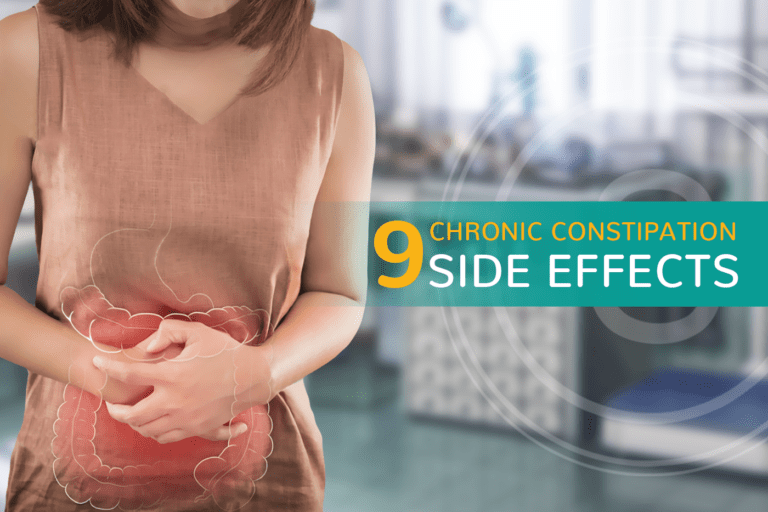How often do you think about constipation?
Probably, very little. SMILES is here to assist you in understanding more about chronic constipation treatment and its effects on your body.
Constipation is generally defined as having less than 3 bowel movements per week. It can mean different things to different people. If you are dealing with constipation for more than 3 months, it is considered chronic constipation that raises your chances of having complications.
Most of us think of constipation as a symptom rather than the cause of their health problems. However, for many functional gastrointestinal conditions like unhealthy balance in the gut microbiome, leaky gut, and food allergies, constipation is definitely the case that you might need to get tested.
Dr.Parameshwara, the best gastroenterologist in Bangalore at SMILES explains what happens to your body when you are constipated.
9 Side Effects of Constipation on the Body
Constipation itself can also be the root cause of various conditions.
The following are some of the effects of constipation that you may be struggling with right now.
1. Colon Absorbs Too Much Water from Wastes
One of the maincauses of constipation is dryness. In a normal digestive system, as food moves through the body ( at a normal rate) & is converted into waste, the intestine absorbs water from it and leads to stool.
In the case of constipation, the food moves too slowly, meaning sit stays too long in the colon and has too much water absorbed. This results in a dry stool which is much harder to push out and get stuck.
2. Gut Flora May Disrupt By An Infection
Constipation is not always caused by a lack of fiber or not drinking enough water. It can also be from various types of medications to infections and pregnancy.
The experts of gastrointestinal disorders explain that constipation may be caused when a bacteria (clostridia) gets into your system through the mouth and disrupts its internal bacterial balance.
3. The Risk of Anal Fissure
The hazard of not having enough lubrication in a stool to pass can get stuck and tears the skin, called an anal fissure. Anal Fissures cause itching, pain, and blood on faeces and in the toilet bowl.
Fissures in Ano can grow larger and affect the ring of muscle at the opening of the anus. Even though anal fissures can be treated with the help of laxatives or stool softeners, sometimes they are harder to heal.
4. Poor Immune System
Intestinal or gut flora is responsible for much of the body’s immune response including the removal of viruses, bacteria, and cancerous cells.
Constipation is often associated with missing or damaged bacteria, so the impact on your immune system can be significant. The toxic buildup and inflammation associated with constipation can also damage the immune system and leaves at risk of developing infections.
5. Faecal Impaction
Faecal Impaction is a result of chronic constipation. It is basically a bowel obstruction caused by poop that has hardened in the colon and can’t be expelled.
Liquid stools can restore the impaction of stool, causing overflow incontinence and often diarrhoea. In severe cases, faecal impaction can cause ulcers or gastrointestinal perforation, also known as ruptured bowel.
6. Stress and Anxiety
Constipation, diarrhoea and many other types of functional gastrointestinal disorders can affect your mood and anxiety, causing stress.
Recent neuroscientific research explores the importance of gut flora in the development of brain cells, such as serotonin. In addition, stress may over-activate the nerves that connect the brain and gut, resulting in embarrassing bowel movements.
7. Diverticulitis
Long-term constipation can increase your risk of developing diverticulitis, where diverticula ( balloon-like sacs) formed naturally on the lining of the colon.
Diverticulitis can also occur due to constipation or by the pressure of straining during bowel movements. If your diverticulitis is chronic, you may eventually become infected and over time it can lead to bowel obstruction.
8. May Affect Bladder Control
Studies suggest that chronic constipation and a strain during bowel movements can affect bladder control and urinary incontinence.
An over-full bowel (due to constipation) can press on the bladder and reduce the amount of urine it can hold or make you feel to urinate urgently. Besides, constipation and an excess strain during movements can also damage your pelvic floor muscles.
9. Rectal Prolapse
Rectal prolapse happens when part of the rectum protrudes from the anus. The rectum is the last part of the large intestine and where faeces are stored before being passed.
Strain while passing stools can make your rectum more likely to stretch and slip outside the body. And, when you are constantly straining during bowel movements over a period of years, it can also cause rectal prolapse.
If you are still suffering from constipation?
Consult our team of experts in gastrointestinal disorders at SMILES for the best treatment for constipation in Bangalore.

